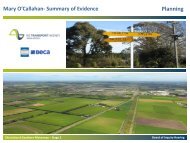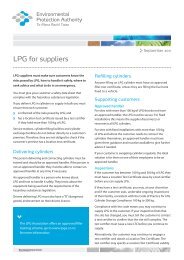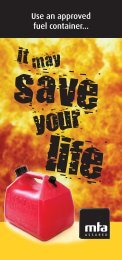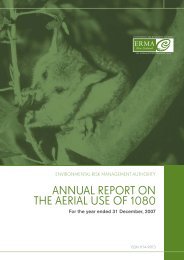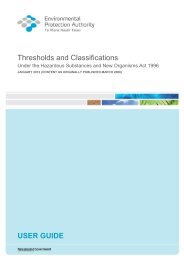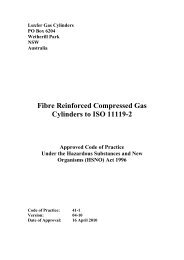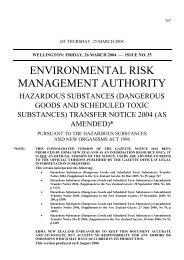- Page 1 and 2:
Application for the Reassessment of
- Page 3 and 4:
6.1 Evaluation of options to streng
- Page 5 and 6:
EXECUTIVE SUMMARYIn briefERMA New Z
- Page 7 and 8:
Aerosol containing 50 g/kgdichlorvo
- Page 9 and 10:
ERMA New Zealand‘s recommendation
- Page 11 and 12:
26 - 29Outdoor public space usage30
- Page 13 and 14:
Substance details1-8,11-16,20-25,30
- Page 15 and 16:
1.2.3 In 2008, the Environmental Ri
- Page 17 and 18:
Table 1. Dichlorvos-containing subs
- Page 19 and 20:
public environments and use for bio
- Page 21 and 22:
available to it. In preparing this
- Page 23 and 24:
3.3 International regulatory positi
- Page 25 and 26:
3.6 Classification3.6.1 The HSNO cl
- Page 27 and 28:
Hazard Class /SubclassClassificatio
- Page 29 and 30:
Hazard Class /SubclassClassificatio
- Page 31 and 32:
Rates:Fogging: 13 ml / litre (water
- Page 33 and 34:
BV2 SurfaceInsecticideBV2 SurfaceIn
- Page 35 and 36:
Table 7.Dichlorvos outdoor and indo
- Page 37 and 38:
Scenario Crop/Use Method Rate Appli
- Page 39 and 40:
humidity conditions. The higher res
- Page 41 and 42:
4.3 EnvironmentIdentification of ad
- Page 43 and 44:
4.3.9.3 Aquatic environment - Groun
- Page 45 and 46:
is considered to be highly improbab
- Page 47 and 48:
RiskGroupRQ range Level of risk Use
- Page 49 and 50:
RiskGroupRQ range Level of risk Use
- Page 51 and 52:
assessment, as the Use Scenario inc
- Page 53 and 54:
Nonnegligible1 < RQ < 10Nonnegligib
- Page 55 and 56:
Table 12.LifecycleStageImport,manuf
- Page 57 and 58:
LifecycleStageUse -bystanderUseScen
- Page 59 and 60:
Table 13.Identification of benefici
- Page 61 and 62:
value that can be attributed to dic
- Page 63 and 64:
outbreak, MAF‘s ability to demons
- Page 65 and 66:
the duty of the Crown is not merely
- Page 67 and 68:
5.1.7.1 J. Hicking stated that dich
- Page 70 and 71:
Table 14. Comparative of hazard cla
- Page 72 and 73:
Crop Pest Active ingredient Preharv
- Page 74 and 75:
Crop Pest Active ingredient Preharv
- Page 76 and 77:
SECTION 6- PROPOSALS TO MANAGE RISK
- Page 78 and 79:
Assessment was carried out with spe
- Page 80 and 81:
6.1.11 Controls to protect bystande
- Page 82 and 83:
Table 16Effect of additional contro
- Page 84 and 85:
Use Scenario Receptor Level of Risk
- Page 86 and 87:
Use Scenario Receptor Level of Risk
- Page 88 and 89:
Use Scenario Receptor Level of Risk
- Page 90 and 91:
Use Scenario Receptor Level of Risk
- Page 92 and 93:
Use Scenario Receptor Level of Risk
- Page 94 and 95:
Use Scenario Receptor Level of Risk
- Page 96 and 97:
Use Scenario Receptor Level of Risk
- Page 98 and 99:
Use Scenario Receptor Level of Risk
- Page 100 and 101:
Use Scenario Receptor Level of Risk
- Page 102 and 103:
Use Scenario Receptor Level of Risk
- Page 104 and 105:
Use Scenario Receptor Level of Risk
- Page 106 and 107:
have, and notes the following as ar
- Page 108 and 109:
Table 18Summary of benefits associa
- Page 110 and 111:
UseScenariosAssessment ofEffectOutc
- Page 112 and 113:
Substance detailsHSR000126DDVPInsec
- Page 114 and 115:
Table 22.there are no practicable r
- Page 116:
7.4 Preliminary Recommendations7.4.
- Page 119 and 120:
method and LOQ)Water (principle ofm
- Page 121 and 122:
Appendix B: Environmental Fate of d
- Page 123 and 124:
Bioconcentration factor Gnathopogon
- Page 125 and 126:
Table C.2:Scenarios used in exposur
- Page 127 and 128:
Scenario 3: Vegetables - 1 applicat
- Page 129 and 130:
FIELD AND STANDARD POND HALFLIFE VA
- Page 131 and 132:
insectivorous bird7 Passionfruit Sm
- Page 133 and 134:
4 Leafyvegetables(BBCH ≥50)4 Leaf
- Page 135 and 136:
summer)7 passionfruit(BBCH 10-19)7
- Page 137 and 138:
Ground (lowboom)0.03 0.03 1.07 1.07
- Page 139 and 140:
Appendix D: Ecotoxicity of dichlorv
- Page 141 and 142:
ioaccumulationClearance timeLevel o
- Page 143 and 144:
Table D.5:Toxicity to terrestrial i
- Page 145 and 146:
Appendix E: Risk Assessment: Enviro
- Page 147 and 148:
Aquatic organsimsTable E.3:Environm
- Page 149 and 150:
12345Crop type Table I.1 (Annex 1)
- Page 151 and 152:
7 passionfruit(BBCH 20-39)7 passion
- Page 153 and 154:
Fruit (tree) 2052 70759 >50Passionf
- Page 155 and 156:
Appendix F: Human Toxicity of dichl
- Page 157 and 158:
CONTENTS:Title Page 11 Purpose 2Con
- Page 159 and 160:
2 SUBSTANCE IDENTIFICATIONIUPAC nam
- Page 161 and 162:
However, dichlorvos has genotoxic p
- Page 163 and 164:
4 ABSORPTION, DISTRIBUTION, METABOL
- Page 165 and 166:
aerosol cans (230-330 g dichlorvos)
- Page 167 and 168:
4.3 Metabolism:found in tissues of
- Page 169 and 170:
dose of 1.0 mg/kg bw, a single gava
- Page 171 and 172:
eports. LD 50 = 46.4 mg/kg b.w. is
- Page 173 and 174:
6 ACUTE DERMAL 6.1HSNO Classificati
- Page 175 and 176:
7 ACUTE INHALATION 6.1HSNO Classifi
- Page 177 and 178:
measured and it was not possible to
- Page 179 and 180:
8 SKIN IRRITATION 6.3 & CORROSION 8
- Page 181 and 182:
9 EYE IRRITATION 6.4 & CORROSION 8.
- Page 183 and 184:
10 RESPIRATORY SENSITISATION 6.5AHS
- Page 185 and 186:
Justification for Classification: U
- Page 187 and 188:
12 MUTAGENICITY 6.6HSNO Classificat
- Page 189 and 190:
ERMA New Zealand CONFIDENTIAL Repor
- Page 191 and 192:
The ATSDR (1997) reported:“Dichlo
- Page 193 and 194:
•ATSDR (1997): http://www.atsdr.c
- Page 195 and 196:
13 CARCINOGENICITY 6.7HSNO Classifi
- Page 197 and 198:
fibroadenomas were observed in 6 (1
- Page 199 and 200:
• Sex/Numbers:• Test material:
- Page 201 and 202:
The NTP Peer Review concluded that:
- Page 203 and 204:
concurrent studies for comparison w
- Page 205 and 206:
The APVMA (2008a) reported a chroni
- Page 207 and 208:
was exposed. The estimated daily in
- Page 209 and 210:
14 REPRODUCTIVE TOXICITY 6.8HSNO Cl
- Page 211 and 212:
ppm during premating days, signific
- Page 213 and 214:
Toxicology, Chemistry and Life Scie
- Page 215 and 216:
addition, there was an increase in
- Page 217 and 218:
• Maternal toxicity NOAEL =• Ma
- Page 219 and 220:
Research Triangle Park, North Carol
- Page 221 and 222:
16 REPRODUCTIVE OR DEVELOPMENTAL TO
- Page 223 and 224:
17 SPECIFIC TARGET ORGAN TOXICITY 6
- Page 225 and 226:
There was a significant dose-relate
- Page 227 and 228:
18 SPECIFIC TARGET ORGAN TOXICITY 6
- Page 229 and 230:
19 SPECIFIC TARGET ORGAN TOXICITY 6
- Page 231 and 232:
20 SPECIFIC TARGET ORGAN TOXICITY 6
- Page 233 and 234:
KEY STUDY:• Type of study:• Spe
- Page 235 and 236:
BACKGROUND:The APVMA (2008a) also r
- Page 237 and 238:
cholinesterases can only be estimat
- Page 239 and 240:
22 SPECIFIC TARGET ORGAN TOXICITY 6
- Page 241 and 242:
Ltd, Sittingbourne Research Center,
- Page 243 and 244:
23 OTHER POTENTIAL TOXIC ENDPOINTS2
- Page 245 and 246:
―Results“Mortalities and clinic
- Page 247 and 248:
1984). QA study. Study conducted ac
- Page 249 and 250:
“No information was located on im
- Page 251 and 252:
“Comment: These incidents clearly
- Page 253 and 254:
25 ACCEPTABLE OPERATOR EXPOSURE LEV
- Page 255 and 256:
to pretreatment activity). When the
- Page 257 and 258:
cholinesterase inhibition in health
- Page 259 and 260:
protect agricultural workers who ha
- Page 261 and 262:
Wash: refers to skin washes; Dressi
- Page 263 and 264:
Hazard Class/SubclassHazardclassifi
- Page 265 and 266:
Hazard Class/SubclassHazardclassifi
- Page 267 and 268:
REFERENCES:APVMA, 2008a. ―DICHLOR
- Page 269 and 270:
Appendix 1:APVMA - Summary of bench
- Page 271 and 272:
“Inhalational NOEL for Occupation
- Page 273 and 274:
activity). In fact, treatment was s
- Page 275 and 276:
LAST PAGEDichlorvos reassessment -
- Page 277 and 278:
Dichlorvos:Occupational, Bystander,
- Page 279 and 280:
CONTENTS:Title Page 11 Purpose 2Con
- Page 281 and 282:
3ACTIVITY SCENARIOS3.1 Table (I) su
- Page 283 and 284:
access of bystanders to treated are
- Page 285 and 286:
can reduce dermal exposures to mixe
- Page 287 and 288:
contaminated with, respectively 0.0
- Page 289 and 290:
The modelling is based upon dischar
- Page 291 and 292:
Table II: Occupational Exposure Est
- Page 293 and 294:
Table III: Occupational Exposure Es
- Page 295 and 296:
Operation / RPE / PPETable IV: Occu
- Page 297 and 298:
1.25L product/ha; work rate, 1.25 h
- Page 299 and 300:
Application: Air-hose RPE + chem. r
- Page 301 and 302:
Application: Half-face RPE + overal
- Page 303 and 304:
P for RPE (% penetration): none, 1
- Page 305 and 306:
Table X: Occupational Exposure Esti
- Page 307 and 308:
provided: work day exposure is limi
- Page 309 and 310:
5POST-APPLICATION OR RE-ENTRY WORKE
- Page 311 and 312:
D = DFR x TC x DA x WR x AR x P / B
- Page 313 and 314:
Re-entry into out-door crops (Scena
- Page 315 and 316:
Re-entry into treated glasshouses d
- Page 317 and 318:
acceptable 240 minutes after applic
- Page 319 and 320:
Re-entry into treated glasshouses u
- Page 321 and 322:
Table XVII: Re-entry into glasshous
- Page 323 and 324:
lowest use rate (52 mg/m 3 ; 1300g
- Page 325 and 326:
DA = percentage dermal absorption [
- Page 327 and 328:
Re-entry into treated enclosed indu
- Page 329 and 330:
nature of the building itself, not
- Page 331 and 332:
Conclusions on re-entry worker expo
- Page 333 and 334:
6BYSTANDER & RESIDENT EXPOSURE & RI
- Page 335 and 336:
Children’s incidental ingestion o
- Page 337 and 338:
Table XX: Spray driftExposure throu
- Page 339 and 340:
Exposure through contactwithcontami
- Page 341 and 342:
Conclusions on bystander and reside
- Page 343 and 344:
Table XXIII: Dichlorvos Use Scenari
- Page 345 and 346:
mixing/loading. Mixing/loading fogg
- Page 347 and 348:
7.23 Re-entry for ventilation of in
- Page 349 and 350:
REFERENCES:APVMA, 2008a. ―DICHLOR
- Page 351 and 352:
Appendix 1:Occupational Exposure Es
- Page 353 and 354:
FactorExposure (μg/kg a.i. handled
- Page 355 and 356:
Inhalation exposure from cylinder c
- Page 357 and 358:
[0.01875 x {(0.018 x 0.05) + (2.68
- Page 359 and 360:
With half-face respirator (protecti
- Page 361 and 362:
With full-body chemical resistant c
- Page 363 and 364:
Appendix 4:Occupational Exposure Es
- Page 365 and 366:
With overalls and gloves (protectio
- Page 367 and 368:
The Dermal Exposure (D) is 2.06 μg
- Page 369 and 370:
TTR = turf transferable residues -
- Page 371 and 372:
F = fraction of residue retained on
- Page 373 and 374:
TTR = transferable residues - the E
- Page 375 and 376:
Public Space ApplicationsScenario (
- Page 377 and 378: ERMA New Zealand‟s comment on the
- Page 379 and 380: Enclosed SpaceAgricultural UseOutdo
- Page 381 and 382: Appendix H: Qualitative Descriptors
- Page 383 and 384: 1.3. The likelihood applies to the
- Page 385 and 386: Appendix I: Data from which classif
- Page 387 and 388: Endpoint Units * Dichlorvos Propoxu
- Page 389 and 390: Toxicity mixture calculationsSubcla
- Page 391 and 392: Subclass 9.3 -Ecotoxicity to terres
- Page 393 and 394: Table J.1:Existing controls for dic
- Page 395 and 396: TrackingcontrolsIdentification cont
- Page 397 and 398: Table J.2:Summary of default contro
- Page 399 and 400: Hazardous Substances (Classes 1 to
- Page 401 and 402: Hazardous Substances (Classes 6, 8,
- Page 403 and 404: Hazardous Substances (Classes 6, 8,
- Page 405 and 406: (a) means piping that—(i) is conn
- Page 407 and 408: Code I29 Regs 51, 52 Signage requir
- Page 409 and 410: Non-HSNO Act controlsAgricultural C
- Page 411 and 412: Appendix K: Overseas regulatory act
- Page 413 and 414: Product Use Further details ofuseSu
- Page 415 and 416: Risk assessment identified concerns
- Page 417 and 418: Current usesFormulations:Methods of
- Page 419 and 420: CanadaStatusPMRA are undertaking a
- Page 421 and 422: Appendix L: Parties consulted durin
- Page 423 and 424: Animal Products Act 19995. The purp
- Page 425 and 426: 14. Regulatory control of these pro
- Page 427: Zealand‘s trade in primary produc
- Page 431 and 432: may be taken to risk management in
- Page 433 and 434: Appendix A• Agricultural Compound
- Page 435 and 436: Appendix O: ReferencesACVM (2010) h



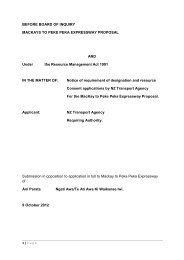
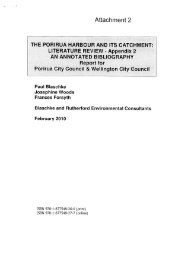
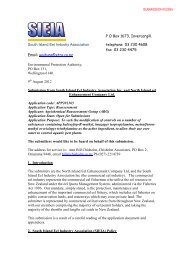

![Application for test certificate [pdf, 131kb]](https://img.yumpu.com/50666502/1/184x260/application-for-test-certificate-pdf-131kb.jpg?quality=85)
